Preaching the Word Series (36 vols.)
Digital Logos Edition
Overview
Noted for its steadfast commitment to biblical authority, its readability, and its clear exposition of Scripture, the Preaching the Word Series is an ideal resource for pastors, teachers, and those seeking to enrich their personal Bible study. This set of commentaries on the Old and New Testaments is edited by renowned pastor, R. Kent Hughes, of College Church in Wheaton Illinois. In this collection, experienced pastors exemplify expository preaching and provide practical applications of 41 books of the Bible, as well as the Sermon on the Mount. Preachers and laity alike will find these commentaries both insightful and accessible.
- Provides practical application from the Scriptures
- Contains exegesis and word study on 41 books of the Bible
- Includes volumes designed to help preachers communicate God’s Word
- Consists of material ideal for pastors and students
It is a pleasure to commend this series of homiletical commentaries. They fill an enormous vacuum that exists between the practical needs of the pastor/teacher and the critical exegetical depth of most commentaries.
—Walter C. Kaiser Jr., emeritus president and distinguished professor of Old Testament and ethics, Gordon-Conwell Theological Seminary
This series will minister to a pastor’s soul as well as giving him an immense resource for his preaching. And it will minister to the parishioner wonderfully in personal Bible story. The reader will be filled with fresh thoughts about our Lord as well as joyful encouragement for himself. That is what happened to me in reading this.
—Kenneth N. Taylor, translator, The Living Bible
This series resonates with the priorities of the pulpit. No academic aloofness here, but down-to-earth, preacher-to-preacher meat for God’s people.
—Bryan Chapell, distinguished professor of preaching, Knox Theological Seminary
The single best resource for faithful biblical exposition available today. A great boon for genuine reformation!
—Timothy George, dean and professor of divinity history and doctrine, Beeson Divinity School, Samford University
There is a long history of informed, edifying biblical expositions that have been mightily used of God to shape and strengthen the church. These volumes admirably fit this tradition.
—D. A. Carson, research professor of New Testament, Trinity Evangelical Divinity School
Throughout the Christian centuries, working pastors have been proving themselves to be the best of all Bible expositors. Kent Hughes stands in this great tradition, and his exciting expositions uphold it worthily.
—J. I. Packer, Board of Governors’ Professor of Theology, Regent College
- Title: Preaching the Word Series
- Series: Preaching the Word
- Publisher: Crossway
- Volumes: 36
- Pages: 14,560
- Christian Group: Evangelicals
- Resource Type: Commentaries
- Topic: Biblical Studies
- Genesis: Beginning and Blessing by R. Kent Hughes
- Exodus: Saved for God’s Glory by Philip Graham Ryken
- Leviticus: Holy God, Holy People by Kenneth A. Matthews
- Numbers: God’s Presence in the Wilderness by Iain M. Duguid
- Deuteronomy: Loving Obedience to a Loving God by Ajith Fernando
- Joshua: People of God’s Purpose by David Jackman
- 1 Samuel: Looking for a Leader by John Woodhouse
- Job: The Wisdom of the Cross by Christopher Ash
- Proverbs: Wisdom that Works by Raymond C. Ortlund Jr.
- Ecclesiastes: Why Everything Matters by Philip Graham Ryken
- The Song of Solomon: An Invitation to Intimacy by Douglas Sean O’Donnell
- Isaiah: God Saves Sinners by Raymond C. Ortlund Jr.
- Jeremiah and Lamentations: From Sorrow to Hope by Philip Graham Ryken
- Daniel: The Triumph of God’s Kingdom by Rodney Stortz
- The Sermon on the Mount: The Message of the Kingdom by R. Kent Hughes
- Matthew: All Authority in Heaven and on Earth by Douglas Sean O’Donnell
- Mark: Jesus, Servant and Savior vols. 1 & 2 by R. Kent Hughes
- Luke: That You May Know the Truth, vol. 1 by R. Kent Hughes
- Luke: That You May Know the Truth, vol. 2 by R. Kent Hughes
- John: That You May Believe by R. Kent Hughes
- Acts: The Church Afire by R. Kent Hughes
- Romans: Righteousness From Heaven by R. Kent Hughes
- 2 Corinthians: Power in Weakness by R. Kent Hughes
- Galatians: Gospel-rooted Living by Todd A. Wilson
- Ephesians: The Mystery of the Body of Christ by R. Kent Hughes
- Philippians: The Fellowship of the Gospel by R. Kent Hughes
- Colossians and Philemon: The Supremacy of Christ by R. Kent Hughes
- 1 & 2 Thessalonians: The Hope of Salvation by James H. Grant Jr.
- 1 & 2 Timothy and Titus: To Guard the Deposit by R. Kent Hughes and Bryan Chapell
- Hebrews: An Anchor for the Soul vols. 1 & 2 by R. Kent Hughes
- James: Faith That Works by R. Kent Hughes
- 1 & 2 Peter and Jude: Sharing Christ’s Sufferings by David Helm
- 1–3 John: Fellowship in God’s Family by David L. Allen
- Revelation: The Spirit Speaks to the Churches by James M. Hamilton Jr.
This title is included in the following collections
You can save when you purchase this product as part of a collection.
Preaching the Word Commentary ...
$758.60$599.992025 Preacher Gold Library
$849.99$679.99Crossway Commentary Collection...
$1,170.41$935.992025 Platinum Library
$1,499.99$1,199.99
- $1,499.99$1,199.99
- $1,629.99$1,222.49
- $1,799.99$1,349.99
- $2,149.99$1,719.99
- $2,399.99$1,919.99
- $2,399.99$1,919.99
- $2,999.99$2,249.99
- $2,999.99$2,249.99
- $2,999.99$2,249.99
- $2,999.99$2,249.99
- $2,999.99$2,249.99
- $3,399.99$2,549.99
- $3,499.99$2,799.99
- $3,899.99$2,924.99
- $3,899.99$2,924.99
- $2,999.99
- $2,999.99
- $4,149.99$3,112.49
- $4,739.99$3,554.99
- $4,749.99$3,562.49
- $4,749.99$3,562.49
- $4,749.99$3,562.49
- $5,999.99$4,499.99
- $5,999.99$4,499.99
- $6,399.99$4,799.99
- $10,999.99$8,249.99
- $23,999.99$17,999.99
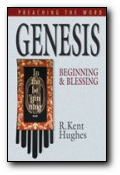
The book of Genesis contains some of the most beautiful and well-known stories in the Bible: the garden, the flood, the tower of Babel, and the lives of the patriarchs. But these are more than just good stories. They lay the groundwork for God’s relationship with humanity and for his plan for our salvation, making Genesis foundational to understanding everything else that happens in the Bible.
Genesis reveals much about human nature and the nature of God. From the actions of the first man and woman, we see where our rebellious, sinful nature originates. And through the whole book we see the hand of a sovereign God who is loving and merciful, but also just and holy. Time and again in Genesis, God showers his grace upon undeserving humanity, giving us our first tastes of God’s enduring faithfulness that shines throughout the entire Bible.
R. Kent Hughes is senior pastor emeritus of College Church in Wheaton, Illinois where he previously served as senior pastor for 27 years. He earned degrees from Whittier College, Talbot School of Theology, Trinity Evangelical Divinity School, and Biola University. Hughes is the author of numerous books, among them the best-selling Disciplines of a Godly Man.
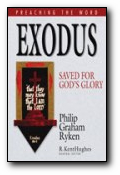
To read Exodus is to encounter God. The book is about the mercy, justice, holiness, and glory of almighty God, who rules history by his sovereign power, saves the people of his covenant, and delivers his people from bondage. Once heard, the stories recorded in Exodus leave a lasting impression. Readers return to these great acts of redemption again and again because they give captives the hope of freedom.
In this Preaching the Word volume, Philip Graham Ryken mines the majestic book of Exodus for knowledge of God’s character and instruction for his followers. So much can be learned about God through the accounts of his deliverance of the Israelites from Egypt, his many divine interventions for them, and his transformation of them into an independent nation.
At once theologically instructive and decidedly practical, this commentary moves readers to great rejoicing at God’s work in the life of every person following him on the path to spiritual freedom. Ryken skillfully relates how the Israelites’ deliverance from slavery anticipated the salvation accomplished in Jesus Christ, proving that God remembers his covenant and always delivers on his promises. For those who preach, teach, and study God’s Word, this book is more than just a commentary; it is a celebration of God’s faithfulness.
Philip Graham Ryken is senior pastor at Philadelphia’s historic Tenth Presbyterian Church. He was educated at Wheaton College, Westminster Theological Seminary, and the University of Oxford, from which he received his doctorate in historical theology.
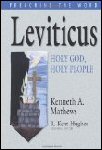
Focused on the Old Testament book of Leviticus, this volume in the acclaimed Preaching the Word series explores how a holy God has made enduring provision for his people to live set-apart lives and worship him. It is the message that God spoke to his people through Moses as they prepared to depart for the Promised Land. It details regulations for holy living and sacrificial worship in Old Testament Israel. But does Leviticus have anything to say to Christians today?
Knowing that readers of the Bible often get hung up on the seeming irrelevance of Leviticus, Kenneth Mathews counters with this insightful Preaching the Word commentary. His chapter-by-chapter analysis reveals much about not only the demands of a holy God but about the kind of relationship he wants with his people and his standards for worship in any age. As Mathews illuminates the significance of Israel’s sacrificial system and symbols, he draws parallel after parallel to Jesus as their perfect fulfillment. His commentary will train pastors, teachers, and serious readers in how Leviticus foreshadows the saving work of Jesus, and the many ways God made accommodation for human sin through Christ.
Dr. Kenneth Mathews is a superb student of the Holy Scriptures who always teaches the Bible with a view toward its proclamation. In this lively exposition, he shows us that Leviticus, though neglected today in many pulpits, is not only theologically seminal but also eminently preachable. A great contribution to this series!
—Timothy George, dean, Beeson Divinity School, Samford University; Senior Editor, Christianity Today
Mathews brings to life the marvelous truths of a book that intimidates and therefore causes far too many to ignore it. This is a welcomed addition to this outstanding series.
—Daniel L. Akin, president, Southeastern Baptist Theological Seminary, Wake Forest, NC
Kenneth A. Matthews (ThM, Dallas Theological Seminary; PhD, University of Michigan) is professor of divinity at Beeson Divinity School, Samford Univeristy, where he teaches Old Testament, Hebrew, and biblical hermeneutics. His noted publications include two commentaries on Genesis and (and as co-author) the Leviticus Scroll from the Dead Sea Scrolls.
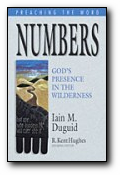
The book of Numbers tells the story of the events occurring in the years between the nation of Israel’s exodus from Egypt and their entrance into the Promised Land. The lives of two generations are recorded: the first lacking in faith and receiving their just punishment from God and the second believing the Word of God and so entering into their inheritance as his children.
Like those generations of Israelites, Christians today are in the midst of a journey between events of deepest significance—the death of Christ that was the exodus from bondage to sin and death and Jesus’ second coming to usher his children into the true and final promised land as a glorious destination to the journey. Author Iain Duguid seeks to aid both pastors and laypeople on this journey by explaining the profundities of the biblical text, especially its less transparent portions, and communicating the lasting message of God’s devotion to those who follow him in faith.
Iain M. Duguid is professor of Old Testament at Westminster Theological Seminary in Escondido, California and co-pastor of Grace Presbyterian Church in Fallbrook, California.
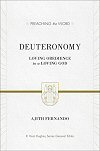
The book of Deuteronomy is a call to obedience—the proper response to God’s faithfulness and love. Consisting primarily of speeches that Moses gave to the Israelites shortly before they entered the Promised Land, Moses’ words proclaimed God’s covenant faithfulness in hopes of motivating the Israelites to obey God despite the coming temptation to conform to the Canaanite culture.
The challenges they faced then are remarkably parallel to those facing Christians today as we grapple with the issue of obedience in a world that offers other attractive ways of life. We wonder: How can we be faithful to God? And how do we help our children and the people we lead to be faithful? This book tells us how Moses tackled these challenges and, as Paul confirms in the New Testament, Deuteronomy serves “as an example…written down for our instruction” (1 Cor. 10:11).
Ajith Fernando unpacks the relevance of Deuteronomy and captivates us with rich anecdotes from his 35 years of ministry to first-generation Christians in Sri Lanka. He offers concrete examples of how the truths contained in Deuteronomy can be applied, and he teaches us that obedience is the necessary response to the God who loves and saves us.
Out of his broad experience of expounding the Scriptures, Dr. Fernando has given us a commentary that will appeal to all those who preach the Word. The work breathes a love for God, a deep understanding of Biblical theology, and a warmly poignant grasp of human nature—with its failings and its potentials. His applications of Deuteronomy’s teaching are both perceptive and relevant. While showing an awareness of scholarly treatments, the work is very accessible to those who do not have scholarly training. It is highly recommended.
—John Oswalt, visiting distinguished professor of Old Testament, Asbury Theological Seminary
Vintage Fernando. Like all of his preaching, this book is a model of the wonderful gift that God has given to Ajith Fernando for simple, clear, and challenging exposition of the Word of God. Without evading the more difficult questions and problems that scholars have wrestled with in the book of Deuteronomy, he does not allow them to dominate but stays close to the thrust of the text, patiently explaining and applying it step by step. The rich infusion of illustrations that are mostly drawn from the challenges and stresses, joys and sorrows of his own experience in ministry add a wonderful earthy texture to the whole book as we constantly weave between the biblical world and today’s world in a way that listens to and engages with both. This book is a deep well of biblical study, ethical challenge, practical advice, pastoral wisdom, and spiritual warmth. It breathes love for God, God’s Word, God’s world, and God’s people.
—Christopher J. H. Wright, director, Langham Partnership International
Ajith Fernando is the teaching director of Youth for Christ in war-torn Sri Lanka after serving as the ministry’s National Director for 35 years. He and his wife, Nelun, are active in a church ministering primarily to the urban poor. His ministry includes mentoring younger staff and counseling Christian workers. He is the author of 15 books published in 18 languages.

Following closely on the heels of the Exodus story, the book of Joshua recounts the mighty acts of God as he fulfills his promises to Abraham, Isaac, and Jacob. It is a profound testimony to God’s awesome power and enduring faithfulness.
Written to aid pastors in their preaching and churches in their reading, this accessible commentary guides us through the history of Joshua’s leadership in Israel and God’s direction of his covenant people to their promised rest in the land of Canaan.
With warmth and wisdom, David Jackman ultimately encourages us to trust God’s promises more deeply and obey his commands more wholeheartedly—that we might fully enjoy all the blessings secured for us in and through our Joshua—Jesus Christ.
Having been frustrated by so many learned Old Testament commentaries, which may be full of good scholarship but offer little help to preachers, it is a joy to recommend such a fine book, which is so clearly the work of someone who is a very fine preacher himself. It is marked by careful exegesis, which reveals the main thrust of Joshua as a whole and each major section without getting lost in unnecessary details. All the big questions the preacher and congregation will ask are addressed and there are excellent pointers to application. It provides fuel, not only for our preaching, but for our hearts and lives.
—Vaughan Roberts, rector of St. Ebbe’s, Oxford
Here is another excellent commentary, which combines great insights of exegesis, theology, relevance, and pastoral application. Every page is enriched by David’s extensive experience and wisdom in understanding and preaching the Bible. This commentary is ideal for those preparing to teach or preach the book of Joshua, as it is also invaluable for Christians who want to understand the book of Joshua and read it for personal encouragement. I praise God for David’s ministry.
—Peter Adam, vicar emeritus, St. Jude’s Church, Carlton, Australia
This is a fine addition to the Preaching the Word series. Jackman combines pastoral sensitivity, erudition, and an experienced feel for the text to give us a guide through the life-changing book of Joshua.
—Josh Moody, Senior Pastor, College Church, Wheaton, Illinois
David Jackman earned his MA from Cambridge and is a renowned Christian speaker and author. In addition to serving as a visiting lecturer at London’s Oak Hill Theological College, he is also a former president of the Proclamation Trust—a ministry dedicated to encouraging and equipping Bible teachers around the world.
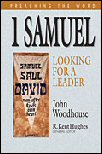
What kind of leaders should we follow? What kind of leaders should we be? And what does God have to do with it? These are some of the questions inherent in 1 Samuel, with its portrait of divine response to ancient Israel’s leadership crisis. That crisis was met through three men—Samuel, Saul, and David—in ways that forever changed the character of Israel’s leadership and clarified what God requires of his people and their leaders.
As John Woodhouse demonstrates, 1 Samuel’s biblical context provides serious reflection on our need for leadership and the failure of human leaders. But it also reveals God’s answer for Israel, which turns out to be his answer for the whole world and for each of us individually. This perceptive commentary not only illumines Old Testament history but brilliantly points to the New Testament promise that was fulfilled in Jesus, our sovereign leader and Savior.
John Woodhouse has been the principal of Moore Theological College in Sydney, Australia, since 2002 and previously was in pastoral ministry in a suburban Sydney church. He has a passion for teaching the Bible in a way that helps people understand the various parts of Scripture in light of the center of God’s revelation, Jesus.

Life can be hard, and sometimes it seems like God doesn’t even care. When faced with difficult trials, many people have resonated with the book of Job—the story of a man who lost nearly everything, seemingly abandoned by God.
In this thorough and accessible commentary, Christopher Ash helps us glean encouragement from God’s Word by directing our attention to the final explanation and ultimate resolution of Job’s story: the life, death, and resurrection of Jesus Christ. Intended to equip pastors to preach Job’s important message, this commentary highlights God’s grace and wisdom in the midst of redemptive suffering.
Taking a staggeringly honest look at our broken world and the trials that we often face, Ash helps us see God’s sovereign purposes for adversity and the wonderful hope that Christians have in Christ.
Christopher Ash writes beautifully—this book is a delight to read! But that isn’t its greatest strength. Nor is the fact that these pages are filled with nuanced and fresh exegetical insights. Christopher has succeeded in producing the richest, most moving, most deeply cross-centered and God-glorifying treatment of Job I have ever read. This book marries brilliant explanation with powerful gospel-driven application. It is simply a ‘must-have’ resource for anyone intending to preach through Job.
—J. Gary Millar, principal, Queensland Theological College
This is one of the finest Biblical commentaries I have had the privilege to read, and certainly the best I know on the wonderful but perplexing book of Job. Christopher Ash takes us into the depths of this book, taking no shortcuts. He guides us through the details, helping us to see the brilliance of the poetry and the profundity of the questions raised. More than this he helps us to see how the sufferings of Jesus shed brilliant light into the darkest corners of Job’s experience. In turn the book of Job deepens our understanding of Jesus’ blameless suffering, and the suffering and darkness experienced by those who share in the sufferings of Christ. This is a powerfully edifying exposition.
—John Woodhouse, former principal, Moore Theological College
If like me, you have shied away from the book of Job, daunted by its structure and length, do not despair, help has arrived! Christopher Ash has performed a noble service by ‘bashing his head’ against the text and providing us with such a lucid, wonderfully helpful commentary. It is both mind-stretching and heart-warming as it reminds us that like the rest of the Bible, Job is ultimately a book about Jesus.
—Alistair Begg, Senior Pastor, Parkside Church, Cleveland, Ohio
Christopher Ash works for the Proclamation Trust in London as director of the Cornhill Training Course. In addition to serving on the council of Tyndale House in Cambridge, he is the author of several books, including Out of the Storm: Grappling with God in the Book of Job and Teaching Romans.
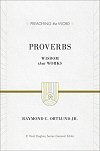
How exactly does one become wise? With the overwhelming flood of information and opinion in our times—much of it a mixture of spin, sound bites, and trivialities—it is crucial we turn back to the Bible and pay close attention to the deep insights that have stood the test of time.
Proverbs 1:20 tells us that “Wisdom cries aloud in the street, in the markets she raises her voice.” The wisdom of God does not stand aloof, but instead graciously moves toward us, into the world where we live and struggle day by day—offering us her very best, if we will only listen.
Pastor and teacher Ray Ortlund unpacks the book of Proverbs in 21 straightforward sermons, providing a biblical worldview on everything from money, sex, and power to that of the daily routines of an average life. Drawing relevant parallels from ancient culture to present day, he helps us understand how the book of Proverbs is practical help for ordinary people going through everyday life.
Most importantly, Ortlund shows how the Proverbs point to Jesus and his counsel for the perplexed, his strength for the defeated, his warning to the proud, his mercy for the broken. With careful treatment of the Scriptures and uncomplicated language, Proverbs: Wisdom that Works bridges the gap between real-life experience and the scholarly depth of many commentaries.
I simply cannot say enough about Ortlund’s treatment of the book of Proverbs. There is depth here—scholarship disguised as pastoral advice. There is breadth here—quoting diverse people from Descartes to Sherlock Holmes. There is heart here—the heart of an evangelist, a pastor, a friend, and one who truly understands the Word. Proverbs: Wisdom that Works shines God’s light on your day in every area of life.
—Woodrow Kroll, senior Bible teacher, Back to the Bible
Ortlund not only speaks wisdom, he models how to speak it. He not only lights the way on how to preach Proverbs, but on how to walk in wisdom—and he makes me want to do both! Almost immediately I had two reactions: ‘Why am I not preaching Proverbs right now?’ and ‘Why am I not wiser by now?’ Turn here not just to hear about wisdom, but also to taste it. You’ll find the savor reverently worshipful, theologically rich, and relentlessly practical.
—John Kitchen, senior pastor, Stow Alliance Fellowship, OH
The strength of Ray Ortlund’s study of Proverbs is its Christ-centeredness. The wisdom of Proverbs loses none of its practical value, but rather is given its ultimate fulfillment as an expression of the wisdom of Christ.
—Graeme Goldsworthy, emeritus lecturer in Old Testament, biblical theology, and hermeneutics, Moore Theological College
Raymond C. Ortlund Jr. is the pastor of Immanuel Church in Nashville, Tennessee. He is the author of several books, including the Preaching the Word commentary on Isaiah, as well as a contributor to the ESV Study Bible.
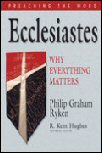
The book of Ecclesiastes is “about life, the way it really is,” writes commentator Philip Ryken. Readers throughout the ages have been drawn to the way it honestly wrestles with the tedium of work, injustices in this life, the ravages of age, and the inevitability of death. But its wisdom, according to Ryken, is in teaching people to trust God with life’s questions even in the midst of struggles. Pastors, writers, speakers, and students will find this Preaching the Word commentary to be a helpful resource in their teaching and studies. Ryken explores what will happen if we choose the world’s offerings instead of God’s and teaches valuable lessons about what it means to have a God-centered worldview.
This is the twenty-sixth volume of the Preaching the Word series—noted for its clear exposition, readability, practical application, and unqualified commitment to biblical authority. Ryken’s commentary will not only enrich any individual study of Ecclesiastes but will equip Christian leaders in communicating its universal application to a wide audience.
Philip Graham Ryken is senior pastor at Philadelphia’s historic Tenth Presbyterian Church. He was educated at Wheaton College, Westminster Theological Seminary, and the University of Oxford, from which he received his doctorate in historical theology.
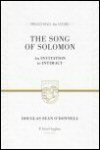
Our culture holds the megaphone when it comes to talking about sex today. Yet the church has maintained a reputation for keeping quiet, hesitant to teach people about this sacred aspect of life. The Song of Solomon, however, holds nothing back as it sings loudly about the holy practice of sexuality and pushes us into the conversation with godly theology.
While this biblical text has been subject to a broader range of interpretation probably than any other book in the Bible, Wisdom Literature expert Doug O’Donnell offers this comprehensible guide to help uncoil its complexities and solve its riddles. He explores the poetry, themes, and wisdom of this song from a Christocentric perspective, and gives us a profound, rich, and witty reflection that encourages right thinking and behavior.
Showing how this “song of songs” is meant to teach us about biblical sexuality and God’s heart for his people, O’Donnell elucidates on the greatest subject of all time—love.
Doug O’Donnell is becoming one of the most edifying pastors of our time. I heartily recommend this wise and winsome set of comments on a biblical book beloved by many Christians through the ages but sorely neglected in the present. May God use this commentary to renew the courage of pastors in preaching the Song of Solomon once again.
—Douglas A. Sweeney, professor of church history and the history of Christian thought, Trinity Evangelical Divinity School
The wisest man this side of the incarnate Christ, inspired by the Holy Spirit, on a topic that always grabs attention, in poetry, in the Bible—could it get any better than the Song of Songs? You won't want to miss Doug O’Donnell’s exposition of the most sublime song.
—Jim Hamilton, assistant professor of biblical studies, the Southern Baptist Theological Seminary
Song of Solomon is a delicate portion of Scripture, and Christians in our sex-crazed culture desperately need a biblical perspective on love and intimacy. Doug O’Donnell is a thoughtful, knowledgeable, reliable guide to this seldom-preached book. O’Donnell is himself a poet and scholar, sensitive to both the art and academic rigors of Solomon’s Song. He hits the mark of being exegetically accurate, thoroughly canonical, and boldly Christological.
—James A. Johnston, senior pastor, Tulsa Bible Church
Douglas Sean O’Donnell is senior pastor of New Covenant Church in Naperville, Illinois. In addition to serving as an instructor for the Charles Simeon Trust, O’Donnell is a member of the North American Patristics Society, the U.S. Board of the Irish Bible Institute, the Center for Pastor Theologians, and the Evangelical Theological Society.
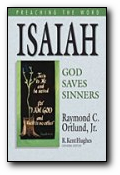
Isaiah is widely considered the deepest, richest, and most theologically significant book in the Old Testament. It is, without question, a profound statement by God about his own sovereignty and majesty spoken through his chosen spokesman, the prophet Isaiah.
In this expository commentary on the book of Isaiah, Raymond C. Ortlund Jr., argues that Isaiah imparts a single vision of God throughout all 66 chapters. It is a unified, woven whole presenting God’s revelation of himself to mankind, breaking through our pretense and clashing “with our intuitive sense of things.” Ortlund makes a point of man’s disinterest in God and his unfailing inclination to disbelief, and thus the need for God to “interrupt our familiar ways of thinking.”
The emphasis of this addition to the Preaching the Word series is this: God saves sinners. He saves them willfully and powerfully and needs no help from us, presenting himself in all his unmistakable glory. The message of Isaiah, shown thoroughly and thoughtfully in this commentary, will reignite a passion for the glory of God in the hearts of believers and will present that glory clearly and potently to those who have yet to be brought to saving faith.
Raymond C. Ortlund Jr. is senior pastor of Christ Presbyterian Church in Nashville, Tennessee.
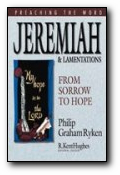
The “Weeping Prophet,” the rabbis said, began wailing the moment he was born. Jeremiah had reason to weep—he witnessed the devastating consequences of life without God.
Sadly, the relativism Jeremiah saw in ancient Israel predominates in America today. That’s why his words are so relevant for our lives. Better than anyone else, Jeremiah exemplifies through his courage, passion, even his sufferings, how believers can live for God in a society that has turned against Him.
While the book of Jeremiah shared the last, desperate days of the Jerusalem he loved, Lamentations expresses the cries of his heart. Yet they reveal more than the prophet’s grief—they are an attempt to reflect on the meaning of human suffering. Lamentations gives voice to the deepest agonies, with the hope that some comfort may come from crying out to God for mercy. Together the two books illustrate the eternal principle that man reaps what he sows.
It is a lesson the world—and the church—needs to hear. With the heart of a pastor and the knowledge of a scholar, Philip Graham Ryken applies these words of life to us today. His commentary will not only help you understand and teach from these spiritually relevant books, but inspire you with the courage and passion of God’s personal call for you to live in these times.
Philip Graham Ryken is senior pastor at Philadelphia’s historic Tenth Presbyterian Church. He was educated at Wheaton College, Westminster Theological Seminary, and the University of Oxford, from which he received his doctorate in historical theology.
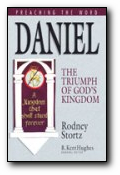
Containing both triumphant stories of God’s provision and difficult prophetic images, the book of Daniel stirs readers’ imagination and interest. Examples abound of Daniel’s unswerving dedication to the God of Israel, and the prophet describes the coming days in striking detail.
Throughout this book the nature of Daniel’s God is revealed to us. God’s plans for the future judgment and deliverance of this world, and his followers’ relationship with him throughout these events, mark the book. He is a God who loves his people and is in sovereign control over all the events of this world. His knowledge and control over both present circumstances and future events is undeniable.
In this study of Daniel, Rodney Stortz showcases the coming triumph of God’s kingdom. Stortz’s careful exegesis and perceptive applications focus on personal holiness, the wisdom and power of God, and the importance of Daniel’s prophecies concerning the Messiah, the Antichrist, and Antiochus Epiphanes. In addition, this commentary uses the light of the New Testament to unseal Daniel’s scroll, giving a clear understanding of his prophecies. This expositional commentary shows plainly how central the book of Daniel is for understanding coming judgment and the necessity for faithful living until then.
Rodney Stortz was senior pastor of Twin Oaks Presbyterian Church in St. Louis, which he planted in 1990. He studied at Covenant College and Covenant Theological Seminary.
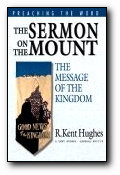
Within the three chapters of Matthew known as the Sermon on the Mount are truths so rich and deep that no matter how often or how closely we examine their words, they continually bring new relevance to our lives. Do you want to know what kind of character you should have as a Christian? What should define your outer way of life and your inner habit of mind? Then study the Sermon. Ponder each sentence and test yourself by it.
There is no other section of Scripture that brings you face to face with your own humanity and the grace of salvation as the Sermon does. As Christ masterfully expounds on the Kingdom of Heaven, He presents believers with the perfect standard of the Christian life. He challenges the genuineness of our words and actions, allowing us to know exactly where we stand in relation to the Kingdom. Both humbling and encouraging, it is the greatest message ever preached.
Kent Hughes faithfully explores the words that penetrate our hearts, and brings forth the lessons from this matchless model of the Christian life.
R. Kent Hughes is senior pastor emeritus of College Church in Wheaton, Illinois, and earned his DMin from Trinity Evangelical Divinity School.
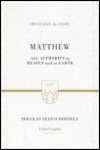
Jesus is King. Standing as a central theme of the Gospel of Matthew, Jesus’ kingly authority has profound implications for our lives today—changing the way we view the world, interact with others, and respond to blessings and hardships.
In this reader-friendly commentary, seasoned pastor Doug O’Donnell leads us through the first book of the New Testament, highlighting key themes and offering contemporary illustrations for preaching. Drawing on years of pastoral experience, O’Donnell helps us to see how Matthew’s various emphases—including Jesus’ messianic titles, fulfillment of Old Testament prophecy, teaching on the kingdom of heaven, and present and future role as judge—all relate to Christ's kingship over all of creation.
Full of biblical insights aimed at both pastors and laypeople, this volume ultimately highlights Matthew’s call to all people to worship and obey Jesus, our humble King and gracious Savior.
Even for the most seasoned of preachers, the thought of expositing the Gospel of Matthew could be overwhelming. Thanks to Doug O’Donnell’s newest commentary, chock-full of impressive insights and engaging wit, the first and perhaps greatest Gospel has suddenly become much less daunting. When Kent Hughes called on O’Donnell to write this volume, he knew exactly what he was doing.
—Nicholas Perrin, Dean, Wheaton College Graduate School
This commentary grows out of wide reading and solid learning—the footnotes alone are a gold mine. O’Donnell writes with a zest for real life, wit, and (controlled) whimsy. The outcome: sermons that both revel in Christ and reveal Christ in fresh and striking ways. The author proves to be a hard-working and natural expositor of Scripture. This book goes to the top of my list of sterling homiletical commentaries on the first Gospel.
—Robert W. Yarbrough, Professor of New Testament, Covenant Theological Seminary
The market is full of critical commentaries, but not many actually deal with what is ‘critical’—the centrality of the gospel, the mission of the Church, and the life of the Christian. Doug O’Donnell’s commentary on Matthew is a clear exception. With sensitivity to all the important narrative and exegetical details, O’Donnell offers an interpretation of the first Gospel that is pastoral throughout, and in some instances, truly profound. Relevant illustrations are used in almost every passage, and numerous issues are addressed with theological vigor and often from the pastoral heritage of the Church. There are times when the critical commentaries are useful, even necessary, but I cannot imagine a pastor preaching through Matthew that would not want to use this commentary as a significant resource.
—Edward Klink, associate professor of New Testament, Talbot School of Theology, Biola University
Douglas Sean O’Donnell is senior pastor of New Covenant Church in Naperville, Illinois. In addition to serving as an instructor for the Charles Simeon Trust, O’Donnell is a member of the North American Patristics Society, the U.S. Board of the Irish Bible Institute, the Center for Pastor Theologians, and the Evangelical Theological Society.
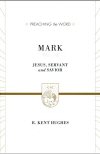
These two print volumes have been combined into one single digital resource for ease-of-use.
These volumes cover the culmination of Jesus’ ministry on earth. Seen in glory on the Mount of Transfiguration, challenged by religious skeptics, Christ moves inexorably toward the Cross, where history’s greatest battle would be fought and won. And so we, like the ancient world, are confronted with the crucified and risen Christ and must decide if we will acknowledge him as our Lord and Savior. Thus in our age of aggressive evil and apathetic faith, the Gospel of Mark resounds with the dynamic power of the Lord Jesus Christ. Perhaps the most dramatic and action-packed of the Synoptic Gospels, Mark’s writing continues to inspire increased commitment in the Church at large.
R. Kent Hughes is senior pastor emeritus of College Church in Wheaton, Illinois, and earned his DMin from Trinity Evangelical Divinity School.
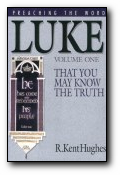
Luke’s carefully researched and “orderly account” of the life of Christ is one of the finest pieces of historical writing in all of ancient literature. Yet it also accomplishes its divinely appointed—and more personal—purpose: that people of every century “may know the truth”.
In this volume, R. Kent Hughes covers the first 11 chapters of Luke with precision and refreshing originality. Luke the historian—with his painstaking reporting—will make you certain about the truth of not only his Gospel, but the gospel. Luke the theologian—with his careful recounting of Christ’s mercy and compassion—will touch you with God’s love and grace. And Luke the physician—with his heart for people, especially the less privileged—will help you to love others more deeply. This may well be the only commentary you’ll ever need to teach and preach the power, the celebration, the glorious message of Luke’s beloved Gospel.
R. Kent Hughes is senior pastor emeritus of College Church in Wheaton, Illinois, and earned his DMin from Trinity Evangelical Divinity School.
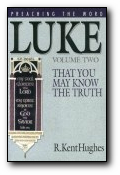
“Those who study Luke cannot stay the same,” says commentator R. Kent Hughes. “He took great pains to present the Gospel with maximum power under the guidance of the Holy Spirit. The result is a compelling story.” Especially when it is read and studied in sequence, as Hughes has done in these two volumes.
This second volume of Hughes’ commentary on Luke starts with chapter 11 and concludes with Christ’s Ascension in chapter 24 of the Gospel. Luke the historian—with his painstaking reporting—will make you certain about the truth of not only his Gospel, but the gospel. Luke the theologian—with his careful recounting of Christ’s mercy and compassion—will touch you with God’s love and grace. And Luke the physician—with his heart for people, especially the less privileged—will help you to love others more deeply. This may well be the only commentary you’ll ever need to teach and preach the power, the celebration, the glorious message of Luke’s beloved Gospel.
R. Kent Hughes is senior pastor emeritus of College Church in Wheaton, Illinois, and earned his DMin from Trinity Evangelical Divinity School.
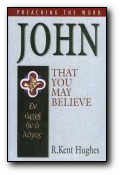
While each of the Gospels presents Christ with a distinct emphasis, the Gospel of John focuses on his greatness. As the timeless Creator-God of the universe. As the Word made flesh. As the gracious Lover of our souls who is the only Way to the Father.
Instead of detailing the facts and events of his earthly life, as the other Gospel writers did, John concentrates on the meaning of Jesus’ words and the message of his works, clearly presenting him as the long-awaited Messiah with one mission in mind—to do the work of the Father who sent him.
Follow along with Kent Hughes in this engaging, verse-by-verse commentary as he leads you through this magnificent Gospel. His careful exposition and wise application will guide you to a richer understanding of not only God’s greatness, but of his great goodness to us all.
R. Kent Hughes is senior pastor emeritus of College Church in Wheaton, Illinois, and earned his DMin from Trinity Evangelical Divinity School.
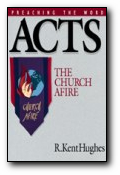
Dynamic churches—congregations that are experiencing phenomenal growth, Christian ministries that God is using to take down walls, churches where souls are being saved and lives transformed—inspire us and make for great reading. The book of Acts, the divinely inspired history of the early church, is all this and more. This encouraging commentary on a marvelous Bible book is sure to challenge all Christian believers who seek to walk with Christ and to serve Him more effectively through the power of the Holy Spirit.
R. Kent Hughes is senior pastor emeritus of College Church in Wheaton, Illinois, and earned his DMin from Trinity Evangelical Divinity School.
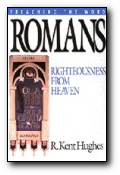
Many Christians, pastors, and laymen alike, consider the Apostle Paul’s Epistle to the Romans the richest lode of theological truth ever written. Its themes of justification by faith, abounding grace, freedom from sin and from the old nature, living sacrifices, God’s sovereignty/man’s responsibility, and much else have both challenged and nourished followers of Christ for centuries. A systematic theology, a practical presentation of the Christian life, an apologetic for the gospel of Jesus Christ—the Book of Romans is all this and more. In this helpful commentary, R. Kent Hughes brings all his talent for clear exposition, pointed application, and literary expression to bear on this power-packed Pauline letter.
R. Kent Hughes is senior pastor emeritus of College Church in Wheaton, Illinois, and earned his DMin from Trinity Evangelical Divinity School.
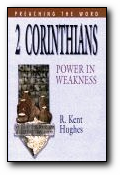
During Paul’s ministry, Corinth was a newly rebuilt, bustling, important city in the Roman Empire. It was a place full of pride, individualism, wealth, and religious pluralism. No wonder its inhabitants held little regard for Paul’s message!
Sound familiar? Our contemporary culture has much in common with ancient Corinth. The relevance of this book to churches today is astounding. Paul delivers powerful theology that turns the values of the ancient Roman world upside-down—the grace of God, the centrality of the cross, and God’s power made perfect in weakness. He challenges us to live counter culturally.
In this commentary on 2 Corinthians, R. Kent Hughes carefully examines this letter from the apostle Paul to the church in Corinth, continuing to provide rich biblical insight for the body of Christ.
R. Kent Hughes is senior pastor emeritus of College Church in Wheaton, Illinois, and earned his DMin from Trinity Evangelical Divinity School.
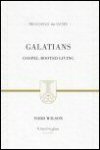
What do you do when you’ve made a mess of things? Where do you go when you’ve blown it badly? How does the death and resurrection of Jesus Christ empower us to combat things like hypocrisy, pride, people-pleasing, and apostasy? Paul’s letter to the Galatians tells us what we need to know in these situations as he teaches us how to rely upon costly grace.
In this fresh and engaging commentary, pastor Todd Wilson invites us to look beneath the surface of controversy in Galatia to the even more fundamental issue at stake: gospel-rooted living. Combining scholarly depth with practical wisdom, he offers us a soulful commentary based on years of ministry experience and biblical reflection. Read Galatians anew with this exegetically engaged, theologically informed, and pastorally minded resource!
Todd Wilson’s exposition of Galatians admirably meets the goals of the Preaching the Word series. Wilson knows all the issues in this letter and treats them with remarkable fairness, always making clear just what the text is communicating to God's people today.
—Douglas J. Moo, Wessner Chair of Biblical Studies, Wheaton College
I am deeply persuaded about the importance of exposition and the need for application and all the main things of sermon preparation. And there is a ton of info out there on how to interpret and outline a passage and settle on the big idea, but so much of it is not reliable. That’s why I recommend this commentary on Galatians from my friend Todd Wilson. Biblical. Solid. Trustworthy.
—James MacDonald, Pastor, Harvest Bible Chapel, Rolling Meadows, Illinois
Todd Wilson has written a deeply pastoral and theologically competent commentary on Galatians that is an exemplary effort at Biblical exposition. There are some doozy passages in Galatians, especially on the Law, and Wilson provides a plain explanation and then shows readers how these texts relate to modern Christian living. A wonderful synergy of homiletical energy and honest exegesis.
—Michael F. Bird, lecturer in theology, Ridley Melbourne College of Mission and Ministry
Todd A. Wilson is senior pastor of Calvary Memorial Church in Oak Park, Illinois. He has authored or edited several books. He earned his PhD from Cambridge.
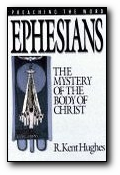
The Apostle Paul’s Letter to the Ephesians is one of the most dynamic portions of all Scripture. Called by one commentator “the crown and climax of Pauline theology,” it issues a clarion call to all who follow the Master. With its dual focus on Christ and the Church, with its careful presentation of doctrine, then duty, it points the way to true Christian living and victory in a sin-embattled world.
R. Kent Hughes is senior pastor emeritus of College Church in Wheaton, Illinois, and earned his DMin from Trinity Evangelical Divinity School.
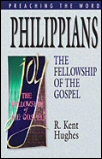
The four chapters of Philippians contain some of the most-quoted and beloved passages in Scripture: “For me to live is Christ, and to die is gain,” “Rejoice in the Lord always,” “Do not be anxious about anything,” “I have learned in whatever situation I am to be content.” Yet in our familiarity with the Apostle Paul’s words to his favorite church, we must be careful not to miss the deeper themes, says commentator R. Kent Hughes. Themes such as the robust fellowship and unity that Paul shared with the Christians at Philippi based on their mutual commitment to the gospel.
Theirs was a partnership we rarely see today—between people who were bound together in the great cause of unfurling the gospel flag in cities, countries, and other cultures—undergirded by Paul’s central call to let their “manner of life be worthy of the gospel of Christ.” It was a joyous cause, a unity, a manner of life that should be ours as well.
The characteristics of such true Christian conduct and spirit are detailed throughout this epistle and this commentary, with every aspect ultimately centering in Christ. Hughes’ faithful exposition and application will reveal how much Philippians is about Christ and about people in Christ Jesus, as well as about people who are in the joyful fellowship of the gospel together because they are in Christ.
R. Kent Hughes is senior pastor emeritus of College Church in Wheaton, Illinois, and earned his DMin from Trinity Evangelical Divinity School.
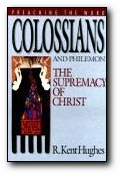
In our day of massive religious confusion, the message of Colossians is among the most timely of all the New Testament books. Today many seek to exclude belief in God from every corner of modern life. Others flaunt “New Age” ideas about God and Christ which collide with the Scriptures. Christians in the first-century city of Colosse lived in a similar situation. Having first received the true Christian faith, they were soon confronted with distortions of the truth concerning the divinity and humanity of Christ and at the same time tempted by spiritual elitism. And the answers they needed are the same timeless answers that the modern world cries out to have.
In this study of Colossians, R. Kent Hughes’ expositions go to the heart of the text in Colossians, amplifying its message with memorable illustrations and penetrating insight. His careful exegesis and perceptive applications offer new understanding and promote lasting growth in Christ. Here is a resource with solid help for pastors, teachers, and indeed anyone who wishes to understand or to communicate the grand message of the book of Colossians—a timely volume with enduring value for the Church of Jesus Christ.
R. Kent Hughes is senior pastor emeritus of College Church in Wheaton, Illinois, and earned his DMin from Trinity Evangelical Divinity School.
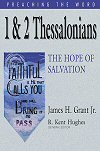
Paul wrote to the church in Thessalonica to encourage them to live in the light of the gospel. In his two letters he addresses a number of topics, including the persecution they were enduring, the second coming of Christ, and how they were to live in the present times. While the letters were written nearly two thousand years ago, James H. Grant Jr. insists that Paul’s audience includes us as well as the Thessalonians.
Grant applies Paul’s message to contemporary churches by moving expositionally through 1 and 2 Thessalonians. 25 sermons examine each passage of the books as the gospel and its implications are unpacked in light of Christ’s second coming.
This is no dry and ponderous commentary, but a unique window into the feelings, the textures, the times, the very hearts of the New Testament writers.
—Frank E. Peretti, author, This Present Darkness
James H. Grant Jr. is pastor of Trinity Reformed Church in Rossville, Tennessee. He also teaches theology at Westminster Academy.
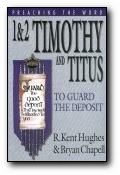
There are substantial reasons to be energized by the prospect of studying the pastoral letters of Paul. Between them they teach the proper ordering of the church (1 Timothy), present a developed challenge to all who call themselves disciples of Christ (2 Timothy), and suggest God’s plan and priorities for mature ministry (Titus)—all so that the Lord may be most glorified.
R. Kent Hughes is senior pastor emeritus of College Church in Wheaton, Illinois, and earned his DMin from Trinity Evangelical Divinity School.
Bryan Chapell is distinguished professor of preaching at Knox Theological Seminary.
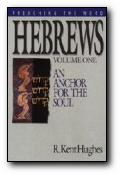
These two print volumes have been combined into one single digital resource for ease-of-use.
The book of Hebrews conveys a double dose of spiritual power. It not only presents the greatness of Christ in ways no other New Testament writing does, but it repeatedly demands a heart response from the reader. No one can study Hebrews and not grow spiritually and come face to face in a new way with Christ.
R. Kent Hughes is senior pastor emeritus of College Church in Wheaton, Illinois, and earned his DMin from Trinity Evangelical Divinity School.
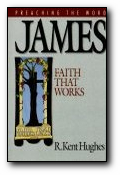
The epistle of James is perhaps the most practical—and most convicting—book of the entire New Testament. It is a marvelous exposition of the outworking of genuine Christian faith. True faith works! An inspiring manual on living Christianity in a fallen world.
R. Kent Hughes is senior pastor emeritus of College Church in Wheaton, Illinois, and earned his DMin from Trinity Evangelical Divinity School.
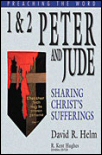
Neither Peter nor Jude minced words about the realities that would confront every Christian and that were confronting the church at large—suffering and persecution, contradictory views of the gospel, constant challenges to the faith at the hands of false teachers. Yet even in the face of these harsh realities, both biblical writers unswervingly declared that there is no cause for despair as long as one’s foundation and identity are in Christ.
With the truths of 1–2 Peter and Jude echoing across the ages, commentator David Helm beckons us to listen in his stirring exposition. Yet it is not enough to listen, he says. Peter’s and Jude’s words must compel us to do just what the early Christians did: hold fast to their identity in Christ, ground themselves in the truth, live lives worthy of their calling, and vigorously contend for the faith.
This book of Bible expositions displays his strengths as a preacher and serves as a model for other Bible teachers. It is vigorous in its defense of spiritual truth, clear in its explanation of biblical words and their contextual meaning, vivid in its use of language and illustrations, well-structured in its exposition of particular Bible passages, and fresh in its practical application of biblical truth to daily Christian life.
—Philip Graham Ryken, senior minister, Tenth Presbyterian Church, Philadelphia
David Helm serves on the pastoral staff of Holy Trinity Church, a multi-congregational church in Chicago. In addition he is the executive director of The Simeon Trust, which partners with churches to train men for gospel ministry.

What does it look like to “walk in the light, as he is in the light,” to truly live as a follower of Christ? This all-important question finds its answer in three letters from the apostle John. Marked by their sermonic tone, devotional fervor, and emphasis on obedience to God’s commands, 1, 2, and 3 John lovingly teach us how to follow Jesus in open devotion to God.
Professor of preaching David L. Allen guides us through 1–3 John with skill and wisdom, offering helpful insights into the Christian life as well as important themes such as:
- The divinity of Christ
- Spiritual rebirth
- The work of Jesus on the cross
- Our responsibility to forsake sin and keep God’s commandments
- The work of the Spirit
- The danger of false teachers
Hermeneutically sound, Christ-centered, and remarkably practical, this study opens up John’s letters anew and lays out the path for us to walk in light of God’s truth and love.
A rich resource covering one of the New Testament’s most profound sections of Scripture, pastors and theologians of all persuasions will benefit from the thorough treatment Dr. Allen gives to these letters. This commentary, like John’s letters, is brimming with gospel hope.
—J.D. Greear, Lead Pastor, The Summit Church, Durham, North Carolina
1-3 John is a welcomed addition to the Preaching the Word series. The 22 studies in this volume reveal careful research, theological insight, and exegetical integrity. Anyone preaching or teaching through the epistles of John will be greatly assisted by this volume. David Allen has rendered a valuable service to the church of the Lord Jesus that will bear fruit for years to come.
—Daniel L. Akin, president, Southeastern Baptist Theological Seminary
In an excellent follow-up to his edited volume Text-Driven Preaching, David Allen crafts 22 sermons on 1, 2, and 3 John that exemplify the qualities that should characterize excellent preaching. These sermons are thoroughly Biblical, hermeneutically sound, Christ-centered, eminently practical, passionate, challenging, clear, and interesting. And these qualities shine through even when he navigates complex semantic issues, deals with heresies like Gnosticism and Docetism, and tackles pressing theological topics like the extent of the atonement. Here is a fine resource for anyone preaching through these three important New Testament letters!
—Gregg R. Allison, professor of Christian theology, Southern Baptist Theological Seminary
David L. Allen is dean of the school of theology, professor of preaching, and George W. Truett Chair of Ministry at the Southwestern Baptist Theological Seminary. He has served as senior pastor of two churches for 21 years and has been a teacher of preachers for more than 25 years.
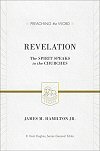
In the book of Revelation, God unveils the world as it really is, identifying an unseen spiritual war and announcing a very real day of judgment. As the end approaches, we need to be convinced that Jesus is reigning as the risen King. We need to have him speak to the situation in our churches. We need to see how God will pulverize wickedness, answer those who oppose him, and establish his eternal kingdom. Revelation has exactly what we need.
Useful for personal study, as well as for preaching and teaching, the 37 sermons in this volume have a clear structure and even include helpful charts and tables to highlight key themes and literary elements. In each sermon, James Hamilton grabs the reader’s attention, raises awareness of a real need, and states the main point of the biblical text. In addition to explaining the meaning of each passage, Hamilton connects the main ideas to applicable analogies and actionable points.
Revelation is a prophecy of epic proportions and Hamilton invites readers to love God and his people by expositing this revelation of Jesus, and to say along with the apostle John, “Come, Lord Jesus.”
Hamilton has done his homework—and numerous footnotes reveal his scholarship—but he keeps the plot moving as he focuses on the pastoral duty of preaching the book. When exegeting difficult texts he presents the best case for differing viewpoints and then argues persuasively for his, all with an eye on preaching. Pastors will find here an inspiring foundation to craft their own sermons (and check their work), and laypeople will discover a pastoral guide through the minefield that is Revelation. Do you have a question about a passage in Revelation? Look here first.
—Michael Wittmer, professor of systematic theology, Cornerstone University
In a day when most preachers appear to be terrified by the prospects of preaching any text beyond the third chapter of the Apocalypse, I find Dr. James Hamilton’s Revelation: The Spirit Speaks to the Churches to be an oasis in the wilderness. Though my own interpretation of the book is light years removed from that of Professor Hamilton, the purity of his love for Christ, for his church, and for the Word of God makes every page a delight to read regardless of his eschatological position.
—Paige Patterson, president, Southwestern Baptist Theological Seminary
James M. Hamilton Jr. is associate professor of biblical theology at The Southern Baptist Theological Seminary. He is author of God’s Indwelling Presence and numerous articles and essays.
Reviews
8 ratings

Jeremy Earnest
3/19/2016

Guy L. Hipp
11/21/2015
J.E. Troy
10/6/2015
Ron Johnson
9/1/2015
EMMANUEL ADETUNJI
7/25/2015
I just discover logos now and i could see its relevancy to my preaching abilities. God bless.
Richard Labelle
7/22/2015
David Gomez
7/15/2015
Rheneas Baloyi
7/7/2015
I am a pastor and have been using wordsearch all the time. I discovered logos - it has changed my preaching. I love logos. Realised the importance of good tools for a work. Well done Faithlife: God bless.
Rich DeRuiter
7/3/2015
This is my favorite homiletical commentary in Logos. There is so much good and practical stuff here. These are actually collections of expository sermons which, I assume, were rewritten an edited for the series. While I don't always agree with the theology, it's rare for me to read on a passage I'm preaching on and not find something helpful. Highly recommended.
Raymond Sevilla
5/13/2015
